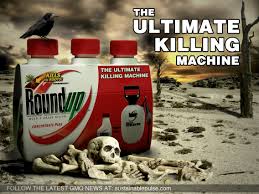
Credit: Sustainablepulse.com
Monsanto suffered a major setback Tuesday when a federal judge in San Francisco unsealed documents that call into question the agrichemical giant’s research practices and the safety of its best-selling herbicide, RoundUp, the world’s most-produced weedkiller. The documents counter industry-funded research that has long asserted Monsanto’s flagship product—used by home gardeners, public park gardeners and farmers, and applied to hundreds of crops—is relatively safe. (emphasis added)
According to the New York Times:
The court documents included Monsanto’s internal emails and email traffic between the company and federal regulators. The records suggested that Monsanto had ghostwritten research that was later attributed to academics and indicated that a senior official at the Environmental Protection Agency had worked to quash a review of Roundup’s main ingredient, glyphosate, that was to have been conducted by the United States Department of Health and Human Services.
One of the documents unsealed by Judge Vince Chhabria was an email written by William F. Heydens, a Monsanto executive, giving his colleagues the green light to ghostwrite glyphosate research and then hire academics to put their names on the papers. […]











Hi Stephan – just as an FYI, the list above is fuzzy and I am unable to read it in my browser. So I Googled “Companies owned by Monsanto” and saw a link to Snopes that you might want to investigate: http://www.snopes.com/politics/business/monsanto.asp
Hi. I absolutely agree that GMOs are a scourge of biodiversity and health, and that as their proponent Monsanto should not be eliminated, it be made financially responsible for the immediate eradication of GMOs and bioremediation of all land and water tainted by its products.
As commenter Elizabeth Balcar pointed out, the list of “Monsanto Companies” appears to be a list of companies that regularly buy GMO ingredients for their products. They are not companies owned by Monsanto. This means that buycotting those companies is an indirect way, rather than a direct one, to negatively impact Monsanto’s bottom line. So, still a worthy exercise. Rather than print out a list, simply look for organic products. That means no GMOs, and no insecticides (like RoundUp, which could be sprayed on “GMO-free” products).
I notice the main article does not contain the list of companies that you begin your comments with. That list seems VERY suspect to me. Where did it come from? Reference, please!